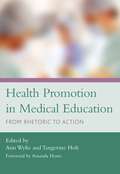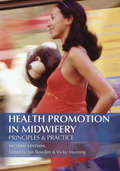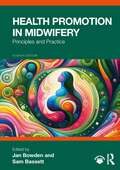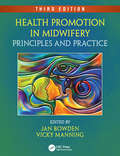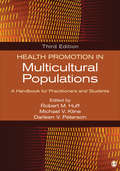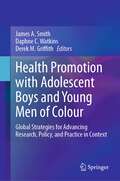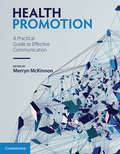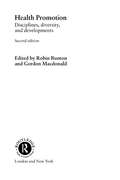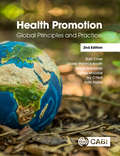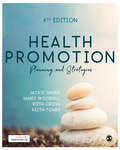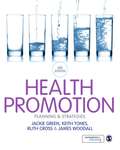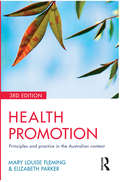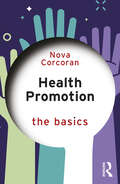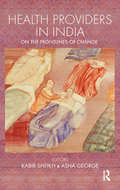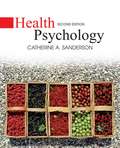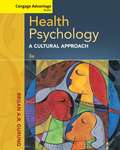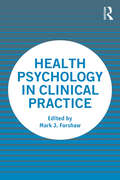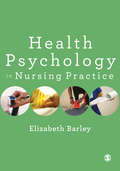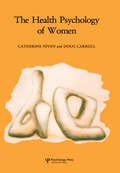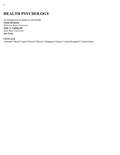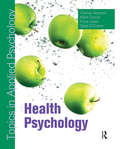- Table View
- List View
Health Promotion in Medical Education: From Rhetoric to Action (Radcliffe Ser.)
by Ann Wylie Tangerine HoltHealth promotion has been a relatively overlooked area in modern medical and health professional vocational curricula. This practical and informative book aims to redress the balance towards health promotion being a visible, integrated curricular component, with agreed principles on quality in health promotion teaching across various faculties. Experienced and enthusiastic writers with expertise in health promotion, public health and medical education explore how curricular structures can accommodate the discipline, providing examples of teaching sessions and methods of teaching health promotion within integrated curricula. 'Do not fear another dry discussion of how to stop patients smoking! This book takes a stimulatingly lateral view of the scope of the subject, goes a very long way to showing why it is essential to medical education, and gives good advice on how to support and develop both the subject and its tutors in today's medical schools.' From the Foreword by Amanda Howe.
Health Promotion in Midwifery : Principles and practice
by Jan Bowden Vicky ManningAn expanded and updated new edition of Health Promotion in Midwifery, this book explores the principles of health promotion within the practical context of midwifery.
Health Promotion in Midwifery: Principles and Practice
by Sam Bassett Jan BowdenThe fourth edition of Health Promotion in Midwifery explores the principles of health promotion within the practical context of midwifery. It clearly outlines and discusses the midwife’s role in health promotion, linking theory, and practice.This thoroughly updated new edition considers recent changes and developments in midwifery practice and public health. It explores essential topics such as infant feeding, smoking, mental health, behaviour change, models for health promotion, violence and abuse, and sexual health promotion and includes seven entirely new chapters. These new additions reflect the need to improve inequalities in care for service users from a range of backgrounds such as for clients from racially diverse communities, clients from the LGBT+ communities, and migrant and displaced clients. Further chapters, such as those looking at public health in a global world, vaccinations in pregnancy, and self-care for midwives, meet needs highlighted by the recent pandemic and its aftermath.Text boxes throughout ensure the text is accessible and user-friendly, and case studies and summaries put the material in a practical context. Further reading sections encourage readers to further research and reflect on their own practice. This textbook is essential reading for all midwives, student midwives, health visitors, and other health care professionals in maternity care education and practice.
Health Promotion in Midwifery: Principles and Practice, Third Edition
by Jan Bowden and Vicky ManningHealth Promotion in Midwifery explores the principles of health promotion within the practical context of midwifery. It clearly outlines and discusses the midwife’s role in health promotion, linking theory and practice. The third edition of this evidence-based text covers essential topics such as breastfeeding, smoking, mental health, behaviour change and sexual health promotion and includes new chapters on healthy eating in pregnancy, pelvic floor health during the childbearing years and violence against women. All the chapters are updated and some are completely rewritten to reflect recent changes and developments in midwifery practice. Text boxes make the text accessible and user-friendly, and case studies and summaries put the material in practical context. Additional readings encourage readers to further research and reflection on their own practice. This textbook is essential reading for midwives and health visitors in education and practice.
Health Promotion in Multicultural Populations: A Handbook for Practitioners and Students
by Dr Robert M. Huff Dr Michael V. Kline Dr Darleen V. PetersonEdited by Robert M. Huff, Michael V. Kline, and Darleen V. Peterson, the Third Edition of Health Promotion in Multicultural Populations offers both students and practitioners an indispensable resource on assessment and implementation guidelines for promoting health and enhancing behaviors that optimize health in any cultural community. Leading experts explore a wide range of topics, including the context of culture, cross-cultural perceptions of health, conceptual approaches to multicultural health promotion, health disparities, and the contributions of multicultural populations. Using the Cultural Assessment Framework (CAF), this proven handbook includes a focus on six specific populations (Hispanic/Latino, African American, American Indian and Alaska Native, Asian American, Pacific Islanders, and Arab Americans).The text concludes with a set of tips for working cross-culturally and a discussion about where the field is heading with respect to research and practice in the 21st century.
Health Promotion in Multicultural Populations: A Handbook for Practitioners and Students
by Dr Robert M. Huff Dr Michael V. Kline Dr Darleen V. PetersonEdited by Robert M. Huff, Michael V. Kline, and Darleen V. Peterson, the Third Edition of Health Promotion in Multicultural Populations offers both students and practitioners an indispensable resource on assessment and implementation guidelines for promoting health and enhancing behaviors that optimize health in any cultural community. Leading experts explore a wide range of topics, including the context of culture, cross-cultural perceptions of health, conceptual approaches to multicultural health promotion, health disparities, and the contributions of multicultural populations. Using the Cultural Assessment Framework (CAF), this proven handbook includes a focus on six specific populations (Hispanic/Latino, African American, American Indian and Alaska Native, Asian American, Pacific Islanders, and Arab Americans).The text concludes with a set of tips for working cross-culturally and a discussion about where the field is heading with respect to research and practice in the 21st century.
Health Promotion with Adolescent Boys and Young Men of Colour: Global Strategies for Advancing Research, Policy, and Practice in Context
by James A. Smith Derek M. Griffith Daphne C. WatkinsThis book highlights novel and pragmatic health promotion efforts being adopted with boys and young men of colour (BYMOC) globally that apply a strengths-based approach. Men's adoption of risky health practices and reluctance to seek help and engage in preventive health behaviours have frequently been used to explain their poorer health outcomes, particularly among adolescent boys and young men, and disproportionately affecting BYMOC. Emerging literature on equity and men's health has conveyed that intersections among age, race, sexuality, socioeconomic status and geography contribute to a complex array of health and social inequities. There is growing evidence to suggest these inequities shape the health practices of BYMOC. Unfortunately, these health and social inequities can have negative lifelong consequences. An increased focus on reducing health inequities has led to a greater focus on health promotion actions that address social and cultural determinants of health.The vulnerabilities that BYMOC face are diverse and are reflected in a range of tailored health promotion interventions. Health promotion approaches that influence structural and systemic inequities experienced by BYMOC have been a prominent feature. In this volume, the editors and contributors purposefully bring together international research and promising practice examples from Australia, the United States, New Zealand, and Canada to celebrate health promotion strategies that help to improve the health and social trajectories of BYMOC. In doing so, the book moves beyond discussing the health inequities faced by this population, to talk about the practical actions to address them in context. Health Promotion with Adolescent Boys and Young Men of Colour brings together diffuse strands of scholarship relating to male health promotion, gender/masculinities and health, equity and men's health, and gender and youth development. The book is a unique and useful resource for practitioners, policy-makers, researchers and students with an interest in health promotion/public health, social work/social policy, education, men's health, youth development, Indigenous studies, and health and social equity.
Health Promotion: A Practical Guide to Effective Communication
by Merryn McKinnonHealth Promotion: A Practical Guide to Effective Communication introduces students to the fundamental principles of health promotion in Australian and international public health contexts. Combining the core principles and theories of health promotion with those of effective communication, the text guides readers through the practical steps of planning, implementing and evaluating programs that empower health consumers and facilitate improved health outcomes for individuals and communities. The chapters consolidate and extend readers' understanding of key topics through case-study scenarios, problem-based learning activities, revision questions and recommendations for further reading. The 'Elsewhere in the World' sections link the text to health promotion programs globally. The final chapter brings together key concepts and highlights initiatives in action through a selection of eight extended international case studies. This essential resource will equip students with the knowledge and tools to prepare them for practice across a range of health and policy settings.
Health Promotion: Disciplines and Diversity
by Gordon Macdonald Robin BuntonHealth promotion is an increasingly central tenet in health professionals' lives. It has come into the public eye as the subject of party politics and policy, but where does the movement come from?This book brings together views from a range of subjects, some not always associated with health promotion, such as marketing or communication theory. Others, such as social policy of psychology may have obvious connections to make; here the implications for practice are discussed fully for the first time. The volume adds up to a timely reflection on the state of health promotion today and will provide practitioners and academics alike with a clearer undersanding of a discipline at the frontier of contemporary policy and practice.
Health Promotion: Global Principles and Practice
by Louise Warwick-Booth James Woodall Ruth Cross Ivy O'Neil Sally Foster Simon RowlandsHealth promotion is a key mechanism in tackling the foremost health challenges faced by developing and developed nations. Covering key concepts, theory and practical aspects, this new edition continues to focus on the themes central to health promotion practice worldwide. Social determinants, equality and equity, policy and health, working in partnerships, sustainability, evaluation and evidence-based practice are detailed, and the critical application of health promotion to practice is outlined throughout the book. Beginning with the foundations of this important area, in this new edition the authors then place greater emphasis on the role of power within health and communities. Drawing upon international settings and teaching experience in the global North and South, it finishes with a summary of the future directions of professional health promotion practice. Placing a strong emphasis on a global context, this book provides an accessible and engaging resource for postgraduate students of health promotion, public health nursing and related subjects, health practitioners and NGOs.
Health Promotion: Planning & Strategies
by Professor Keith Tones James Woodall Ruth Cross Professor Jackie GreenGlobally recognized as the definitive text on health promotion, this fourth edition becomes ever more useful for public health and health promotion courses around the world. It offers a firm foundation in health promotion before helping you to understand the process of planning, implementing and assessing programmes in the real world. To further help you in your studies the book comes with access to online resources which include: 15 original case studies from around the world that give an insight into practice and evaluation Full text further reading to help with assignments and exams Weblinks to help you explore key organisations and institutions in the field.
Health Promotion: Planning & Strategies
by Professor Keith Tones James Woodall Ruth Cross Professor Jackie GreenGlobally recognized as the definitive text on health promotion, this fourth edition becomes ever more useful for public health and health promotion courses around the world. It offers a firm foundation in health promotion before helping you to understand the process of planning, implementing and assessing programmes in the real world. To further help you in your studies the book comes with access to online resources which include: 15 original case studies from around the world that give an insight into practice and evaluation Full text further reading to help with assignments and exams Weblinks to help you explore key organisations and institutions in the field.
Health Promotion: Planning & Strategies (Modular Texts Ser.)
by Jackie Green Keith Tones James Woodall Ruth CrossThe definitive text on health promotion, this book covers both the knowledge-base and the process of planning, implementing and evaluating successful health promotion programmes. This new edition features a companion website developed with an international team of contributors to support teaching and enhance learning. The website provides: · 14 new and original international case studies of health promotion in action · Example discussion questions to encourage critical reflection in seminars and assessments · Free SAGE journal articles which support evidence-based learning. Recent developments are covered throughout this third edition on topics such as asset-based approaches, mental health promotion and the use of social media in promoting health.
Health Promotion: Planning & Strategies (Modular Texts Ser.)
by Professor Keith Tones James Woodall Ruth Cross Professor Jackie GreenThe definitive text on health promotion, this book covers both the knowledge-base and the process of planning, implementing and evaluating successful health promotion programmes. This new edition features a companion website developed with an international team of contributors to support teaching and enhance learning. The website provides: · 14 new and original international case studies of health promotion in action · Example discussion questions to encourage critical reflection in seminars and assessments · Free SAGE journal articles which support evidence-based learning. Recent developments are covered throughout this third edition on topics such as asset-based approaches, mental health promotion and the use of social media in promoting health.
Health Promotion: Principles and practice in the Australian context
by Elizabeth Parker Mary-Louise Fleming'An excellent introduction to the theory and practice of health promotion in a developed country such as Australia'From the foreword by Professor Brian OldenburgThis widely used text offers a comprehensive overview of the field of health promotion. Drawing on current Australian and international research, the authors provide a detailed review of health promotion principles. They demonstrate how these principles fit into the broader public health context, and how they can be integrated into practice in a range of settings, including the workplace, schools, rural communities, Indigenous communities and health care organisations.The authors also include a step-by-step guide to program management from planning to evaluation.This third edition includes new material on the use of evidence in health promotion practice, and on the increasing importance of an ecological perspective. The text has been fully revised with new data and case studies, and planning models have been updated to reflect current practice.Health Promotion is an essential text for students and a valuable resource for health professionals.
Health Promotion: The Basics (The Basics)
by Nova CorcoranHealth Promotion: The Basics introduces not only the fundamental theories and key concepts within this important area of health and social care, but translates these into practice for anyone working in the field. The chapters are structured around the WHO’s Ottawa Charter (1986) which underpins the discipline, and cover a comprehensive range of topics. From developing personal skills to understanding government policy, the book looks at health promotion on both an individual and a societal level. It spotlights key topic areas from behaviour change to climate change, as well as exploring how where we live impacts our health, and features practical examples for integrating health promotion into existing service provision and through community action. Including case studies throughout, and further reading for those wishing to explore specific topics, this is the perfect introduction to what health promotion means and how it can improve everyday lives.
Health Providers in India: On the Frontlines of Change
by Kabir Sheikh Asha GeorgeThis volume has articles contributed by health researchers, practitioners, policy advocates, programme managers and a journalist, and poems by renowned poet–physician Gieve Patel. Each presents a distinctive view of a particular group of frontline health providers, based on field research or on the authors’ respective experiences of working with or as providers. The health providers addressed in this volume include doctors (working in the public and private sectors), nurses, public health workers, counsellors, traditional practitioners and homecare providers. Different groups of health providers face struggles at diverse frontiers — social, professional and systemic. In the context of reforming health systems, government health workers must constantly negotiate the vagaries of changing working environments and policy vacillations. For traditional and homecare providers, formal health systems and structures often only reject and exclude their contributions. Medical doctors, conversely, face difficult challenges of introspection, as they tread the line between personal gain and public service. The ideas and themes that emerge in this collection not only contribute to the understanding of providers’ roles as actors in the health systems and societies of contemporary India, but re-examines preconceptions about this critical occupational group. This volume advances the case for a deeper appreciation of India’s complex landscape of healthcare provision, and of the potential roles of frontline health providers as central figures in development.
Health Psychology (2nd Edition)
by Catherine A. SandersonThe 2nd Edition of Catherine Sanderson's Health Psychology targets the mainstream health psychology market and offers a broad appeal through its narrative that is both challenging for psychology majors and accessible to non-majors. This book provides current and relevant information while providing a foundation in scientific research and critical and analytical thinking. The book emphasizes practical and real-world issues. Additionally, this text includes a focus on current ethical issues in health; expanded coverage of international health; increased emphasis on critical thinking and analysis; coverage of specific topics such as complementary and alternative medicine, accidents as a cause of death, and the role of ethnicity and gender in influencing health behavior; an emphasis on practical information; and updated coverage of all material which is particularly important in the field of health psychology given the dramatic advances in knowledge about the factors that influence physical well-being during the last five years.
Health Psychology (A Cultural Approach)
by Regan A. R. GurungUsing a conversational style that conveys the excitement, research base, and real-world applications of the field, Regan A. R. Gurung introduces health psychology with an integrated cultural perspective. Gurung focuses on key determinants of behavior--such as family, ethnicity, and religion--which are not always highlighted in health psychology books. The text is packed with the most up-to-date citations available, presenting topics taken straight from headline news as well as classic issues in the field. A range of vivid examples from different cultural groups provides you with a comprehensive description of basic theories and an overview of cutting-edge research in health psychology. Special sections that highlight clinical applications, coverage of personality and social psychological theories, and chapters devoted to variations in cultural beliefs, human development, and different diseases combine to give you the best of many worlds.
Health Psychology in Clinical Practice
by Mark J. ForshawHealth Psychology in Clinical Practice provides a collection of first-hand accounts from several of the most established and experienced clinically working Health Psychologists in the UK, explaining what they do, how they do it and why their work is important. In recent years, health psychologists have come into their own in being able to provide high-quality, evidence-based, clinical support for patients by utilising relevant therapies. Trainees and would-be clinical practitioners in the health psychology community are keen to learn more about this aspect of their craft, and this book provides a valuable source of information they can turn to – unlike the vast majority of literature on clinical practice in psychology, written by clinical psychologists, which is mostly of tangential relevance to a health psychologist. As a compilation, the first-hand accounts within Health Psychology in Clinical Practice provide a guide that will help define what clinical health psychology is and should be for a decade or more. This book is an essential resource as a crucial snapshot of practice in the discipline in the UK and will additionally support trainees and those seeking a career in health psychology centered on practice rather than research or teaching.
Health Psychology in Nursing Practice
by Elizabeth BarleyHealth Psychology in Nursing Practice gives nurses and healthcare practitioners the essentials of health psychology to assist patients and their relatives in adjusting to diagnoses, coping with treatments and other disease-related life changes, managing symptoms and making healthy choices. Directly aimed at nurses, this textbook helps them improve their practice in a very practical way. Key features: * Concise content specifically aimed at nurses and other healthcare professions and taking both an evidence-based and applied approach * Key learning objectives and chapters summaries for revision * Case examples give even more insight into how theory works in the real world * Reflective activities help think about real life practice and quizzes test your knowledge Elizabeth Barley is a Chartered Psychologist, Practitioner Health Psychologist and Registered General Nurse. She is Professor in Health and Wellbeing at the University of West London and Visiting Senior Lecturer at the Florence Nightingale Faculty of Nursing and Midwifery, King's College London.
Health Psychology in Nursing Practice
by Elizabeth BarleyHealth Psychology in Nursing Practice gives nurses and healthcare practitioners the essentials of health psychology to assist patients and their relatives in adjusting to diagnoses, coping with treatments and other disease-related life changes, managing symptoms and making healthy choices. Directly aimed at nurses, this textbook helps them improve their practice in a very practical way. Key features: * Concise content specifically aimed at nurses and other healthcare professions and taking both an evidence-based and applied approach * Key learning objectives and chapters summaries for revision * Case examples give even more insight into how theory works in the real world * Reflective activities help think about real life practice and quizzes test your knowledge Elizabeth Barley is a Chartered Psychologist, Practitioner Health Psychologist and Registered General Nurse. She is Professor in Health and Wellbeing at the University of West London and Visiting Senior Lecturer at the Florence Nightingale Faculty of Nursing and Midwifery, King’s College London.
Health Psychology of Women
by NivenFirst Published in 1993. Routledge is an imprint of Taylor & Francis, an informa company.
Health Psychology: An Introduction to Behavior and Health
by Jess Feist Linda Brannon John A. UpdegraffDrawing from the latest research and developments from the field, Brannon/Updegraff/Feist's HEALTH PSYCHOLOGY: AN INTRODUCTION TO BEHAVIOR AND HEALTH, 10e, delivers balanced coverage of the cognitive, behavioral and biological approaches to health psychology. Extremely student friendly and popular with majors and nonmajors alike, this market leader features an engaging writing style, a variety of learning tools and a wealth of visuals. <p><p>Diversity in health psychology is emphasized throughout. New coverage includes the COVID-19 pandemic, the dangers of e-cigarettes, the Type D personality as a risk for heart disease, the brain disease model of alcoholism, the impact of exercise on sleep and more. "Real World Profiles" illustrate chapter concepts in the context of the lives of actual people, and an author-curated list of online multimedia links provides trusted resources for exploring on your own.
Health Psychology: Critical Concepts In Psychology (Topics in Applied Psychology)
by Charles AbrahamTopics in Applied Psychology offers a range of accessible, integrated texts ideal for courses in applied psychology. The books are written by leading figures in their field and provide a comprehensive academic and professional insight into each topic. They incorporate a range of features to bring psychology to life including case histories, research methods, ethical debate and learner activities. Each chapter opens with learning objectives to consolidate key points. A reading list and sample essay questions at the end of chapters enable further independent study. The series also offers an appreciation of multiple perspectives, examines the relationship between psychology and other cognate disciplines and discusses recent developments in each field. Topics in Applied Psychology will provide you with the tools you need to engage with, enjoy and understand your applied psychology discipline, ultimately ensuring confidence and success in exams as well as a comprehensive grounding in the profession. Health Psychology guides the reader through core issues in health psychology research and practice. Each chapter builds on previous ones so that the text provides an overview of the field rather than presenting a compendium of topics. The book discusses mechanisms, models and methods and examines how biological, cognitive, affective and social processes impact on health and illness. It also explores how stress and coping mechanisms affect health behaviours and the psychological determinants of health behaviour. Two chapters focus on how psychological research can be applied to change health-related attitudes and behaviours. Communication between the patient and practitioner is examined as is the role of the health psychologist. The integrated and interactive approach, combined with the comprehensive coverage, make this book the ideal companion for courses in health psychology.Other books in the series include: Clinical Psychology, Criminal Psychology, Educational Psychology, Organizational and Work Psychology and Sport and Exercise Psychology.
